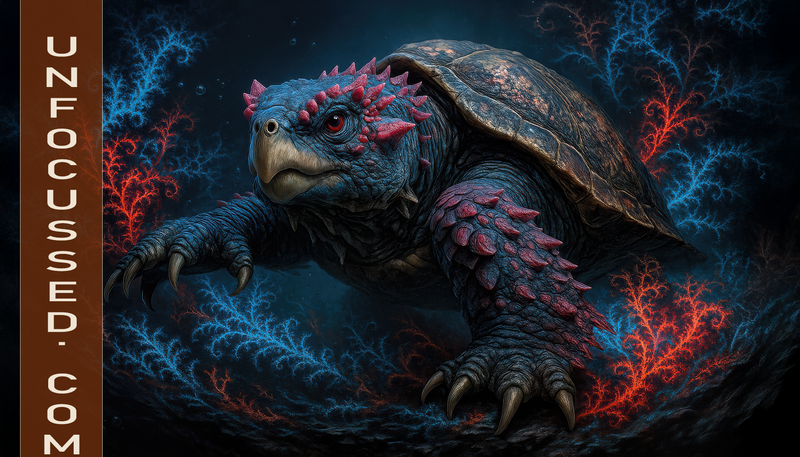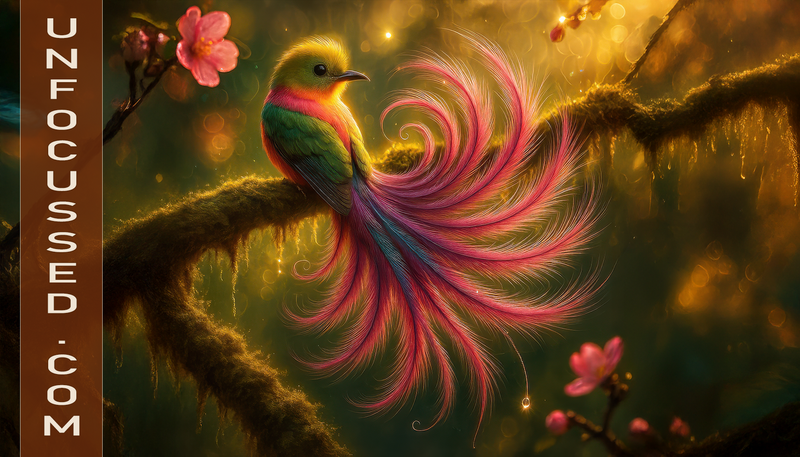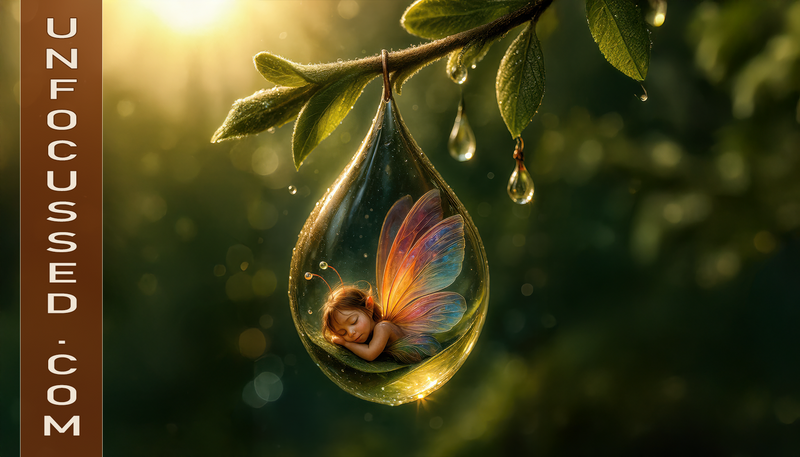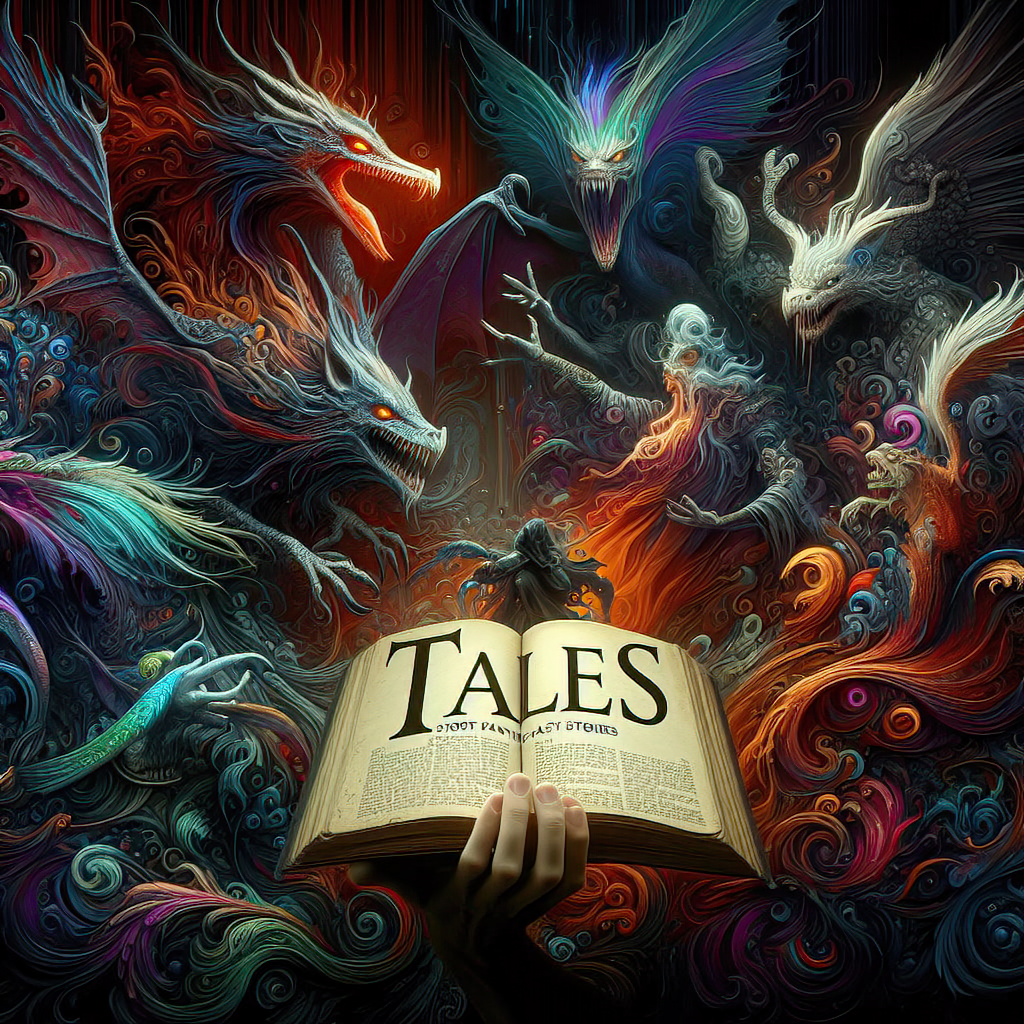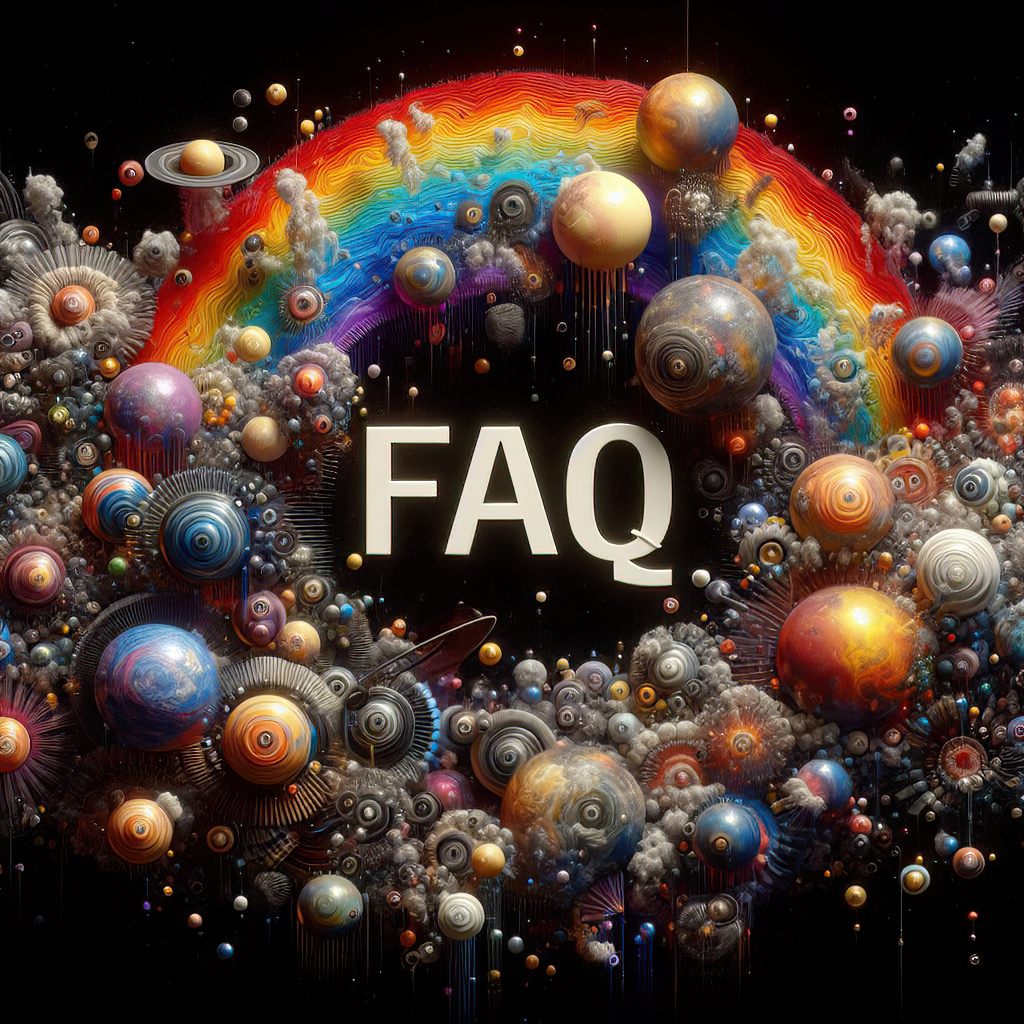
by Bill Tiepelman
Flame-Bird and Fang-Face
The Fire-Bird and the Fang-Fool Deep in the Whisperwood, where trees mutter rumors about squirrels and moss throws shade like a drag queen at brunch, lived a dragon named Fang-Face — though that wasn't his real name. His birth name was Terrexalonious the Third, but it didn’t exactly roll off the tongue mid-scream, so “Fang-Face” stuck. He was enormous, scaly, and charming in a "forgot-to-brush-his-fangs-for-five-centuries" kind of way. His eyes bulged with the constant manic energy of someone who’d consumed way too many enchanted espresso beans — which he absolutely had. Fang-Face had one obsession: jokes. Practical, mystical, elemental, existential — the type that’d make a philosopher cry into their goblet of fermented thought. The problem? The forest folk didn’t get him. His punchlines landed like soggy mushrooms on a wedding cake. No one laughed, not even the trees — and those things loved low-hanging fruit. Then came the phoenix. She burst into Fang-Face’s glade in a fiery swoop of sass and song, burning a rude shape into the moss as she landed. Her name was Blazette. Full name? Blazette Featherflame the Incorrigible. And incorrigible she was. She had talons sharp enough to slice through passive aggression and a beak that never shut up. Her feathers shimmered like molten sarcasm, and her laugh could peel bark off a pine at twenty paces. She was, as she put it, “too hot for these basic birch bitches.” Their first meeting went exactly as you'd expect two egos with no brakes to go. “Nice teeth,” Blazette smirked, hopping up onto a log. “Did your orthodontist have a vendetta against symmetry?” “Nice wings,” Fang-Face grinned. “You always this flammable, or is it just when you're talking?” They stared at each other. Tension crackled in the air like overcooked bacon. And then — chaos. Matching cackles erupted across the glade, echoing through the trees and terrifying a nearby deer into spontaneous leg yoga. It was love at first insult. From that day forward, the dragon and the phoenix became inseparable — mostly because nobody else could stand them. They filled the forest with mischief, misquotes, and midair roasting sessions (both literal and figurative). But something was coming. Something even more chaotic. Something with feathers, scales… and a grudge. And it all started with a stolen acorn. Or was it an enchanted egg? Honestly, both were shaped suspiciously alike, and Fang-Face had stopped labeling his snack stash centuries ago. Talons, Teeth, and a Terrible Idea Let’s rewind to the incident that flapped this whole mess into motion. It was a Tuesday. Not that weekdays mattered in Whisperwood — time was more of a loose suggestion there — but Tuesday had a vibe. A “let’s do something stupid and blame it on the cosmic alignment” kind of vibe. Fang-Face had just finished etching a caricature of a squirrel into a boulder using nothing but heat vision and mild resentment, when Blazette crash-landed through a vine-draped canopy carrying what appeared to be a large, glowing nut. “I stole an acorn,” she declared triumphantly, wings slightly smoking. “That’s... a Fabergé egg,” Fang-Face said, peering at it through the smoke. “I’m 90% sure it’s humming in Morse code.” “It was guarded by three talking mushrooms, a raccoon in a kimono, and something that kept chanting ‘do not disturb the egg of Moltkar.’ What do you think that means?” Fang-Face shrugged. “Probably nothing important. Forest’s always having an identity crisis.” He poked it with a claw. The egg hiccuped and glowed brighter. A faint whisper curled into the air: “Return me or perish.” “Ooooh,” Blazette grinned, “it talks! I call dibs!” They tucked the egg behind a boulder next to Fang-Face’s lava lamp collection and immediately forgot about it. That is, until night fell. That’s when the sky turned pink. Not a gentle cotton-candy pink. We’re talking retina-singeing, gum-chewed-by-a-unicorn pink. Trees began to sway rhythmically, like they were at a rave no one had been invited to. Somewhere in the distance, a kazoo played a single ominous note. “Did you hear that?” Blazette whispered, feathers twitching. “Yup,” Fang-Face nodded. “Either the egg’s waking up, or the forest’s been possessed by sentient interpretive dance.” They returned to the egg. Except it wasn’t an egg anymore. It had hatched. Kind of. Because what now sat in its place wasn’t a chick or a dragonling or even a mildly cursed puffball. It was… a goose. An extremely angry, six-foot-tall, glowing, telepathic goose wearing a tiara made of stars. “I AM MOLTINA, QUEEN OF THE REALM-BRINGER, DESTROYER OF PEACE, MOTHER OF MIGRATION!” the goose thundered, telepathically of course, because her beak never moved — it was too regal for articulation. Fang-Face blinked. “You’re adorable.” Blazette whispered, “I think we made a celestial oopsie.” “You dare call me adorable?!” Moltina flared, and the ground under them cracked like a cookie in a tantrum. “Ma’am,” Blazette said, stepping forward with her most diplomatic head tilt, “I’d like to formally apologize for stealing your… cosmic nesting space. I assumed it was a snack. You know. Because acorn-sized. And glowing. And snarky.” Moltina narrowed her eyes. “Your apology has been logged. For future mockery.” Now, Fang-Face was many things: dangerous, flamboyant, emotionally unavailable — but he was also clever in the way only someone with access to ancient scrolls and an unnecessary amount of free time could be. He started plotting. “Okay, Blazey,” he whispered later that night, as Moltina constructed a throne of enchanted pinecones, “what if we… adopted her?” “What?” “Hear me out. We raise her. Mold her. Channel that cosmic rage into interpretive dance or amateur pottery. She’ll never destroy the world if she’s emotionally codependent on us!” Blazette rubbed her temple. “That is the single most irresponsible idea I’ve ever heard, and I once tried to light a marshmallow with a spell from the Forbidden Tome of Flammable Regret.” “So that’s a yes?” She paused. “I mean... she is kind of fluffy.” And so it began. The rearing of Moltina. Queen of Cosmic Judgment. Now self-appointed “baby goose of mild chaos.” They taught her everything a young omnipotent avian needed to know: how to toast mushrooms without igniting their social anxiety, how to sass a unicorn into therapy, how to sing folk ballads about moss in three languages (one of them being interpretive sneezing). At first, things were actually... kind of adorable. Whisperwood warmed up to the trio. Mice threw them festivals. Badgers knit them passive-aggressive scarves. A dryad opened a juice bar in their honor. But of course, it didn’t last. Because you can't raise a storm without getting a little wet. And Moltina? She was a monsoon with opinions. And when a celestial goose decides it's time for a coronation... well, darling, you'd better have confetti. Or at least body armor. Coronation, Catastrophe, and Cosmic Clarity The forest had seen many strange things. A weeping willow that gossiped about everyone’s love life. A hedgehog cult that worshipped a vending machine. Even that one time a thundercloud got drunk on fermented pollen and ranted for three days about its divorce. But nothing — nothing — had prepared it for Moltina’s coronation. It began at dawn, as most dramatic events do, because golden lighting flatters everyone. The invitation had gone out in dreams, sung directly into the subconscious minds of all sentient life within a five-mile radius. The message? Simple: “Attend, or regret your vibe for eternity.” Fang-Face and Blazette had tried — tried — to keep it low-key. Some bunting, a reasonable amount of glitter explosions, just a few enchanted butterflies with tiaras. But Moltina had “a vision,” and unfortunately, that vision involved seven hundred floating crystal orbs, a choir of operatic possums, and a light show so intense it gave a willow tree anxiety-induced vertigo. “Why are the badgers spinning in synchronized circles?” Blazette whispered from her perch on the ceremonial perch-perch (don’t ask). “Did they rehearse this?” “I think they’re possessed,” Fang-Face muttered. “But politely.” Then the drums began. No one had brought drums. No one owned drums. And yet, somewhere in the heavens, rhythm had taken root. A path of glowing mushrooms unfurled across the clearing, forming a runway. And strutting down that runway, wings flared and tiara ablaze, came Moltina — her feathered form radiant, her eyes filled with unknowable power and the smugness of a goose that knew she was a main character. “Citizens of the Rooted Realms,” she projected directly into their minds, “today we gather to honor me. For I have grown beyond chickhood. I have eaten enlightenment and pooped stardust. I am ready to rule.” There was a beat of stunned silence. Then, someone sneezed confetti. Fang-Face, who had prepared a speech (against everyone’s better judgment), stepped forward. “We are honored, Your Quackiness,” he began. “Your radiant fluff has brought joy, confusion, and occasional structural damage to us all. May your reign be long, chaotic, and mildly threatening.” “Amen,” said Blazette, already sipping from a mug labeled “This is Fire Whiskey, Fight Me.” But, just as Moltina was about to ascend her throne — which was a floating platform made entirely out of recycled soap operas and gold leaf — something crackled in the distance. A ripple tore across the sky. The pink turned to violet. Time stuttered, like a hiccup in reality’s matrix. And into the glade stepped... another goose. This one was taller. Sleeker. Wearing a scarf that somehow screamed “I'm with HR.” “Oh hell,” Blazette groaned. “It’s the Bureau.” “The what-now?” Fang-Face asked, already flexing in case violence was needed. “The Celestial Avian Bureau of Order and Oopsies,” the new goose intoned, her voice a cold breeze across their minds. “I am Regulatory Agent Plumbella. I am here to investigate the unlawful hatching of Moltina, unauthorized coronation proceedings, and disturbance of multi-planar harmony.” “Unlawful hatching?!” Moltina squawked. “I AM THE FLAME OF ASCENSION! THE DESTINY-GOOSE OF LEGENDS!” “You were supposed to remain in cosmic stasis until the next galactic solstice,” Plumbella replied flatly. “Instead, you were poached out of your egg by a manic phoenix and a drama-lizard with caffeine issues.” Fang-Face raised a claw. “Objection. I’m more of a flamboyant chaos reptile, thank you.” “Doesn’t matter. The egg was sacred. The prophecy was clear: you were to bring balance to the celestial grid, not bedazzle the trees and start a jazz cult.” “It’s not a cult,” Moltina hissed. “It’s an enthusiasm-based goose movement!” “You summoned a cloud shaped like your own face that cries glitter,” Plumbella deadpanned. “That cloud has feelings!” Things escalated quickly. There was a dance-off. A very intense magical trivia round. At one point, Moltina and Plumbella battled in interpretive combat, using choreographed honks and feather-daggers woven from sarcastic wind. The forest held its breath. The frogs took bets. And then, right in the middle of a particularly dramatic goose pirouette, Fang-Face stomped a claw. “ENOUGH!” he bellowed. “Look, she may be premature, overpowered, and a bit of a tyrannical sparklebomb, but she’s ours. She chose us. We raised her. We taught her to swear in ten elemental dialects. Isn’t that what parenting’s about?” Blazette stepped up. “She’s part of this forest now. Whether she rules or throws cosmic tantrums in a tutu, she belongs here. Among her weird-ass family.” Plumbella paused. She looked around at the expectant faces — the badgers, the frogs, the possum choir now weeping softly into their velvet hoods — and she sighed. “Fine. One probationary cycle,” she said. “But if she summons another sky-llama, we’re having a very formal chat.” “Deal!” Moltina shouted, before hugging everyone at once in a burst of radiance and feathers. And so, the forest was saved. Or doomed. Or — more likely — somewhere deliciously in between. Fang-Face, Blazette, and Moltina went on to become the most infamous trio in Whisperwood. They hosted interdimensional comedy festivals. They co-authored a bestselling book on goose-based diplomacy. And once, they even got arrested for impersonating a prophecy. But that, dear reader, is another story. Take the Mischief Home: If you’ve fallen in love with the feathered sass of Blazette, the fangy charm of Terrexalonious (a.k.a. Fang-Face), or the celestial chaos of Moltina, you can bring their legendary nonsense into your world — no forest residency required. Adorn your realm with the epic tale frozen in vivid detail, whether as a magical tapestry for your wall of wonders, a framed print that even Plumbella might approve of, or a canvas masterpiece worthy of its own coronation. And for the mischief-minded puzzle lover, dare to piece together the cosmic hilarity with this premium jigsaw puzzle — because even chaos can come in 500 tiny pieces. Available now at shop.unfocussed.com





